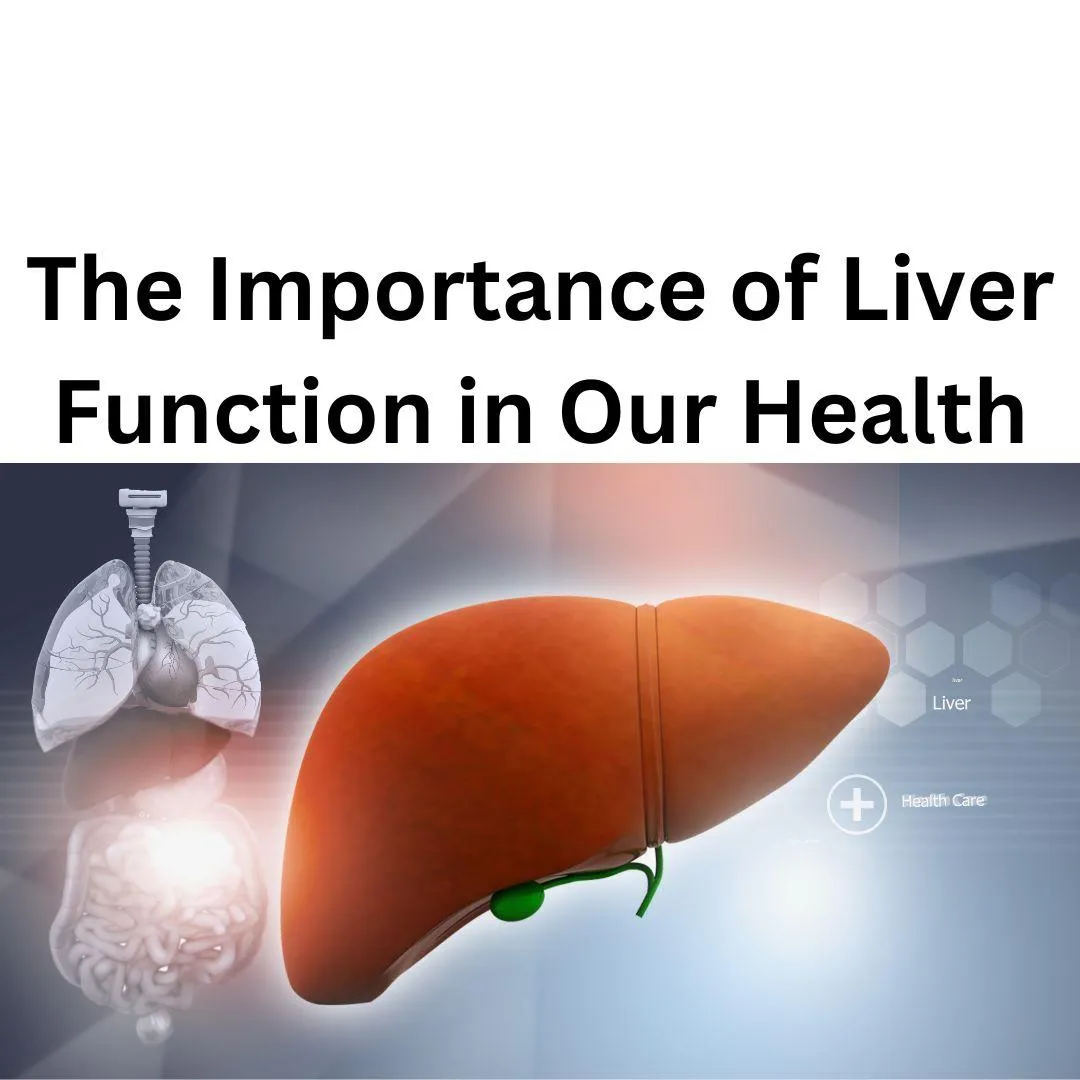*Open to Florida Residents
Blog
Blog

The Importance of Liver Function in Hormone Balance, Metabolism, and Overall, Health
The liver is one of the most vital organs in the human body, performing hundreds of essential functions that sustain life. Often referred to as the body’s natural detoxifier, the liver’s role extends beyond filtering toxins. It is intricately involved in regulating hormone balance, optimizing metabolism, and maintaining overall health. Understanding the liver’s multifaceted functions highlights why maintaining its health crucial.
Hormone Balance
The liver plays a pivotal role in maintaining hormonal balance by metabolizing and clearing excess hormones from the body. Hormones like estrogen, testosterone, cortisol, insulin and thyroid hormones are processed in the liver to ensure their levels remain within optimal ranges. Let’s explore how the liver interacts with specific hormones:
Estrogen: The liver metabolizes estrogen into water-soluble forms that can be excreted via urine or bile. If liver function is impaired, excess estrogen can accumulate, leading to estrogen dominance. This condition is associated with symptoms such as heavy menstrual bleeding, mood swings, and an increased risk of conditions like endometriosis and certain cancers.
Testosterone: The liver helps regulate testosterone levels by converting it into inactive metabolites when necessary. Poor liver health can lead to imbalances, such as reduced testosterone levels in men, contributing to symptoms like low energy, decreased muscle mass, and diminished libido.
Cortisol: Known as the stress hormone, cortisol is metabolized by the liver to maintain proper levels in the bloodstream. An overburdened liver can result in prolonged elevated cortisol levels, which may cause chronic stress, fatigue, and increased susceptibility to illness.
Insulin: The liver regulates blood sugar levels by storing glucose as glycogen and releasing it as needed. It also plays a role in degrading excess insulin. Liver dysfunction can contribute to insulin resistance, a hallmark of type 2 diabetes.
Thyroid Hormones: The liver is essential for converting thyroxine (T4) into triiodothyronine (T3), the active form of thyroid hormone. T3 regulates the body’s metabolic rate, energy levels, and temperature. Impaired liver function can lead to reduced T3 levels, contributing to symptoms of hypothyroidism.
Progesterone: Like estrogen, progesterone is also metabolized by the liver. Disruption in this process can lead to imbalances, which may cause menstrual irregularities, mood changes, and challenges with fertility.
Additionally, the liver produces sex hormone-binding globulin (SHBG), a protein that binds to hormones like estrogen and testosterone, regulating their availability in the bloodstream. A dysfunctional liver can alter SHBG levels, leading to hormonal imbalances.
Metabolism:
The liver is a metabolic powerhouse. It regulates the metabolism of carbohydrates, fats, and proteins, ensuring the body has a steady supply of energy and essential nutrients. Here's how it contributes:
Carbohydrate Metabolism: The liver stores excess glucose as glycogen and releases it when energy is needed. It also plays a role in gluconeogenesis, the process of generating glucose from non-carbohydrate sources, which is vital during fasting or intense physical activity.
Fat Metabolism: The liver synthesizes bile, essential for breaking down dietary fats and absorbing fat-soluble vitamins like A, D, E and K. it also regulates cholesterol levels by producing, storing and clearing cholesterol as needed.
Protein Metabolism: The liver is responsible for processing amino acids and producing essential proteins, such as albumin and clotting factors. It also converts ammonia, a byproduct of protein metabolism, into urea, which is excreted through urine
Disruptions in these processes can lead to metabolic disorders, such as insulin resistance, imbalances in lipid profile, and fatty liver disease.
What is Fatty Liver Disease?
Fatty liver disease, characterized by an accumulation of fat in the liver cells, is a growing global health concern it is broadly classified into two types:
Non-Alcoholic Fatty Liver Disease (NAFLD): associated with obesity, insulin resistance, and metabolic syndrome.
Alcoholic Fatty Liver Disease (AFLD): resulting from excessive alcohol consumption.
Both types of fatty live disease impair liver function and can lead to serious complications, such as liver inflammation (steatohepatitis), fibrosis, cirrhosis, and an increased risk of liver cancer.
The effects of fatty liver disease extend far beyond the liver itself:
On Hormones: Fatty liver disrupts the metabolism of key hormones. For instance, it exacerbates estrogen dominance by impairing estrogen clearance. It also affects the conversion of thyroid hormones, potentially leading to hypothyroid symptoms, and disrupts cortisol metabolism, contributing to chronic stress and inflammation.
On Metabolism: Fatty liver disease interferes with the liver’s ability to regulate blood sugar and lipid levels. This can result in insulin resistance, elevated blood sugar levels, and dyslipidemia (abnormal cholesterol and triglyceride levels), increasing the risk of type 2 diabetes and cardiovascular disease.
On Detoxification: A fatty liver is less efficient at detoxifying the body. This can lead to the accumulation of toxins and waste products, which may cause systemic inflammation, fatigue, and a weakened immune response.
On Overall Health: Fatty liver disease is linked to increased oxidative stress and chronic inflammation, which can contribute to conditions such as hypertension, kidney dysfunction, and even cognitive decline.
Detoxification and Immune Function
The liver is the body’s primary detoxification organ, responsible for neutralizing and eliminating harmful substances. Its detoxification process occurs in two phases:
Phase 1 Detoxification: The liver uses enzymes, primarily from the cytochrome P450 family, to modify toxins and make then more water-soluble. This step often generates reactive intermediates, which can be harmful if not processed further.
Phase 2 Detoxification: The liver conjugates these intermediates with substances like glutathione, sulfate, or amino acids, making them safer and easier to excrete via urine or bile.
Key detoxification tasks include:
Breaking down alcohol, medications, and environmental toxins.
Clearing excess hormones such as estrogen.
Metabolizing bilirubin, a byproduct of red blood cells breakdown.
Neutralizing free radicals and reducing oxidative stress.
Impairment in detoxification can lead to toxin accumulation, resulting in systemic inflammation, oxidative damage, and heightened disease risk.
The liver also plays a critical role in immune defense. It contains specialized immune cells, such as Kupffer cells, which:
Detect and destroy pathogens and cellular debris
Regulate the body’s inflammatory response to prevent excessive damage.
Contribute to immune tolerance, minimizing allergic and autoimmune reactions.
Additionally, the liver produces key proteins involved in the immune system, such as
C-reactive protein (CRP): Helps mark pathogens for destruction.
Complement proteins: Aid in the destruction of harmful invaders.
A compromised liver weakens these immune functions, increasing susceptibility to infections and prolonged inflammatory conditions.
Ways to Support Liver Health
Given the liver’s indispensable role, it is vital to adopt lifestyle habits that support its health:
Eat a Balanced Diet: Focus on whole foods rich in fiber, antioxidants and healthy fats. Limited processed foods, excessive sugar, and alcohol.
Stay Hydrated: Adequate water intake helps the liver flush out toxins efficiently.
Exercise Regularly: Physical activity enhances liver function by reducing fat accumulation and improving insulin sensitivity.
Avoid Toxins: Minimize exposure to harmful chemicals in household products, pesticides, and unnecessary medications.
Prioritize Regular Check-Ups: Routine liver function tests can help detect early signs of liver dysfunction.
Consider Detoxification Programs: A targeted detoxification process can benefit the liver by reducing its toxin load and improving its efficiency. Such programs often include:
Nutritional Support: Consuming foods rich in antioxidants (like berries and leafy greens) and compounds that support liver detoxification (such as cruciferous vegetables, garlic and turmeric).
Hydration: Drinking sufficient water to assist in flushing out toxins through urine and bile.
Supplementation: Incorporating supplements like mild thistle, dandelion root, and glutathione, which are known to enhance liver health and detoxification.
Fasting or Cleanses: Intermittent fasting or short-term cleanses can give the liver a break and improve its regenerative capacity.
However, it is essential to approach detoxification programs with caution and ideally under the guidance of a healthcare professional to ensure they are safe effective for your individual needs.
In summary, the liver’s influence on hormone regulation, metabolism, detoxification and immune function underscores its importance in overall health. By supporting liver health through conscious lifestyle choices, we can promote hormonal balance, optimize metabolic functions, and enhance our well-being. Protecting this vital organ is an investment in a healthier, more vibrant life.
Disclaimer:
This content is for informational and educational purposes only. It is not intended to provide medical advice or to take the place of medical advice or treatment from a personal health care professional. All viewers of this content are advised to consult their own qualified health professionals regarding specific health questions. Neither Vivien Murphy, or Elite Sexual Hormone Health takes responsibility for possible health consequences of any person or persons reading or following the information in this education’s content. All viewers of this content, especially those taking prescription or over the counter medications should consult their medical providers before beginning any nutrition, supplement or lifestyle program.

The Importance of Liver Function in Hormone Balance, Metabolism, and Overall, Health
The liver is one of the most vital organs in the human body, performing hundreds of essential functions that sustain life. Often referred to as the body’s natural detoxifier, the liver’s role extends beyond filtering toxins. It is intricately involved in regulating hormone balance, optimizing metabolism, and maintaining overall health. Understanding the liver’s multifaceted functions highlights why maintaining its health crucial.
Hormone Balance
The liver plays a pivotal role in maintaining hormonal balance by metabolizing and clearing excess hormones from the body. Hormones like estrogen, testosterone, cortisol, insulin and thyroid hormones are processed in the liver to ensure their levels remain within optimal ranges. Let’s explore how the liver interacts with specific hormones:
Estrogen: The liver metabolizes estrogen into water-soluble forms that can be excreted via urine or bile. If liver function is impaired, excess estrogen can accumulate, leading to estrogen dominance. This condition is associated with symptoms such as heavy menstrual bleeding, mood swings, and an increased risk of conditions like endometriosis and certain cancers.
Testosterone: The liver helps regulate testosterone levels by converting it into inactive metabolites when necessary. Poor liver health can lead to imbalances, such as reduced testosterone levels in men, contributing to symptoms like low energy, decreased muscle mass, and diminished libido.
Cortisol: Known as the stress hormone, cortisol is metabolized by the liver to maintain proper levels in the bloodstream. An overburdened liver can result in prolonged elevated cortisol levels, which may cause chronic stress, fatigue, and increased susceptibility to illness.
Insulin: The liver regulates blood sugar levels by storing glucose as glycogen and releasing it as needed. It also plays a role in degrading excess insulin. Liver dysfunction can contribute to insulin resistance, a hallmark of type 2 diabetes.
Thyroid Hormones: The liver is essential for converting thyroxine (T4) into triiodothyronine (T3), the active form of thyroid hormone. T3 regulates the body’s metabolic rate, energy levels, and temperature. Impaired liver function can lead to reduced T3 levels, contributing to symptoms of hypothyroidism.
Progesterone: Like estrogen, progesterone is also metabolized by the liver. Disruption in this process can lead to imbalances, which may cause menstrual irregularities, mood changes, and challenges with fertility.
Additionally, the liver produces sex hormone-binding globulin (SHBG), a protein that binds to hormones like estrogen and testosterone, regulating their availability in the bloodstream. A dysfunctional liver can alter SHBG levels, leading to hormonal imbalances.
Metabolism:
The liver is a metabolic powerhouse. It regulates the metabolism of carbohydrates, fats, and proteins, ensuring the body has a steady supply of energy and essential nutrients. Here's how it contributes:
Carbohydrate Metabolism: The liver stores excess glucose as glycogen and releases it when energy is needed. It also plays a role in gluconeogenesis, the process of generating glucose from non-carbohydrate sources, which is vital during fasting or intense physical activity.
Fat Metabolism: The liver synthesizes bile, essential for breaking down dietary fats and absorbing fat-soluble vitamins like A, D, E and K. it also regulates cholesterol levels by producing, storing and clearing cholesterol as needed.
Protein Metabolism: The liver is responsible for processing amino acids and producing essential proteins, such as albumin and clotting factors. It also converts ammonia, a byproduct of protein metabolism, into urea, which is excreted through urine
Disruptions in these processes can lead to metabolic disorders, such as insulin resistance, imbalances in lipid profile, and fatty liver disease.
What is Fatty Liver Disease?
Fatty liver disease, characterized by an accumulation of fat in the liver cells, is a growing global health concern it is broadly classified into two types:
Non-Alcoholic Fatty Liver Disease (NAFLD): associated with obesity, insulin resistance, and metabolic syndrome.
Alcoholic Fatty Liver Disease (AFLD): resulting from excessive alcohol consumption.
Both types of fatty live disease impair liver function and can lead to serious complications, such as liver inflammation (steatohepatitis), fibrosis, cirrhosis, and an increased risk of liver cancer.
The effects of fatty liver disease extend far beyond the liver itself:
On Hormones: Fatty liver disrupts the metabolism of key hormones. For instance, it exacerbates estrogen dominance by impairing estrogen clearance. It also affects the conversion of thyroid hormones, potentially leading to hypothyroid symptoms, and disrupts cortisol metabolism, contributing to chronic stress and inflammation.
On Metabolism: Fatty liver disease interferes with the liver’s ability to regulate blood sugar and lipid levels. This can result in insulin resistance, elevated blood sugar levels, and dyslipidemia (abnormal cholesterol and triglyceride levels), increasing the risk of type 2 diabetes and cardiovascular disease.
On Detoxification: A fatty liver is less efficient at detoxifying the body. This can lead to the accumulation of toxins and waste products, which may cause systemic inflammation, fatigue, and a weakened immune response.
On Overall Health: Fatty liver disease is linked to increased oxidative stress and chronic inflammation, which can contribute to conditions such as hypertension, kidney dysfunction, and even cognitive decline.
Detoxification and Immune Function
The liver is the body’s primary detoxification organ, responsible for neutralizing and eliminating harmful substances. Its detoxification process occurs in two phases:
Phase 1 Detoxification: The liver uses enzymes, primarily from the cytochrome P450 family, to modify toxins and make then more water-soluble. This step often generates reactive intermediates, which can be harmful if not processed further.
Phase 2 Detoxification: The liver conjugates these intermediates with substances like glutathione, sulfate, or amino acids, making them safer and easier to excrete via urine or bile.
Key detoxification tasks include:
Breaking down alcohol, medications, and environmental toxins.
Clearing excess hormones such as estrogen.
Metabolizing bilirubin, a byproduct of red blood cells breakdown.
Neutralizing free radicals and reducing oxidative stress.
Impairment in detoxification can lead to toxin accumulation, resulting in systemic inflammation, oxidative damage, and heightened disease risk.
The liver also plays a critical role in immune defense. It contains specialized immune cells, such as Kupffer cells, which:
Detect and destroy pathogens and cellular debris
Regulate the body’s inflammatory response to prevent excessive damage.
Contribute to immune tolerance, minimizing allergic and autoimmune reactions.
Additionally, the liver produces key proteins involved in the immune system, such as
C-reactive protein (CRP): Helps mark pathogens for destruction.
Complement proteins: Aid in the destruction of harmful invaders.
A compromised liver weakens these immune functions, increasing susceptibility to infections and prolonged inflammatory conditions.
Ways to Support Liver Health
Given the liver’s indispensable role, it is vital to adopt lifestyle habits that support its health:
Eat a Balanced Diet: Focus on whole foods rich in fiber, antioxidants and healthy fats. Limited processed foods, excessive sugar, and alcohol.
Stay Hydrated: Adequate water intake helps the liver flush out toxins efficiently.
Exercise Regularly: Physical activity enhances liver function by reducing fat accumulation and improving insulin sensitivity.
Avoid Toxins: Minimize exposure to harmful chemicals in household products, pesticides, and unnecessary medications.
Prioritize Regular Check-Ups: Routine liver function tests can help detect early signs of liver dysfunction.
Consider Detoxification Programs: A targeted detoxification process can benefit the liver by reducing its toxin load and improving its efficiency. Such programs often include:
Nutritional Support: Consuming foods rich in antioxidants (like berries and leafy greens) and compounds that support liver detoxification (such as cruciferous vegetables, garlic and turmeric).
Hydration: Drinking sufficient water to assist in flushing out toxins through urine and bile.
Supplementation: Incorporating supplements like mild thistle, dandelion root, and glutathione, which are known to enhance liver health and detoxification.
Fasting or Cleanses: Intermittent fasting or short-term cleanses can give the liver a break and improve its regenerative capacity.
However, it is essential to approach detoxification programs with caution and ideally under the guidance of a healthcare professional to ensure they are safe effective for your individual needs.
In summary, the liver’s influence on hormone regulation, metabolism, detoxification and immune function underscores its importance in overall health. By supporting liver health through conscious lifestyle choices, we can promote hormonal balance, optimize metabolic functions, and enhance our well-being. Protecting this vital organ is an investment in a healthier, more vibrant life.
Disclaimer:
This content is for informational and educational purposes only. It is not intended to provide medical advice or to take the place of medical advice or treatment from a personal health care professional. All viewers of this content are advised to consult their own qualified health professionals regarding specific health questions. Neither Vivien Murphy, or Elite Sexual Hormone Health takes responsibility for possible health consequences of any person or persons reading or following the information in this education’s content. All viewers of this content, especially those taking prescription or over the counter medications should consult their medical providers before beginning any nutrition, supplement or lifestyle program.
Let me help you achieve your goals.
Disclaimer: We understand that every individual's experience is unique and results may vary depending on various factors, such as attitude, adaptability, personal history, and overall health. For your safety and well-being, we highly recommend consulting your physician before beginning any program. At Elite Sexual Hormone Health, we do not diagnose, treat, or prescribe any medical or psychological disorders. We urge you to seek the care of a qualified physician or psychotherapist if you suffer from any psychological or medical disorder. Thank you for choosing Elite Sexual Hormone Health as your partner in your journey towards wellness.
© 2025, Elite Sexual Hormone Health. All rights reserved.
Privacy Policy | Terms of Service | Disclaimer
© 2025, Elite Sexual Hormone Health. All rights reserved.
Website by Hypnotherapy Accelerator





